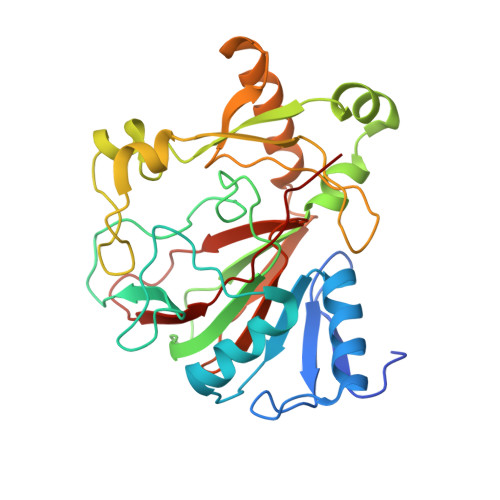Development of enzymes for robust aryloxyphenoxypropionate and synthetic auxin herbicide tolerance traits in maize and soybean crops.
Larue, C.T., Goley, M., Shi, L., Evdokimov, A.G., Sparks, O.C., Ellis, C., Wollacott, A.M., Rydel, T.J., Halls, C.E., Van Scoyoc, B., Fu, X., Nageotte, J.R., Adio, A.M., Zheng, M., Sturman, E.J., Garvey, G.S., Varagona, M.J.(2019) Pest Manag Sci 75: 2086-2094
- PubMed: 30828945
- DOI: https://doi.org/10.1002/ps.5393
- Primary Citation of Related Structures:
6D0O, 6D1O, 6D3H, 6D3I, 6D3J, 6D3M - PubMed Abstract:
Effective management of weedy species in agricultural fields is essential for maintaining favorable growing conditions and crop yields. The introduction of genetically modified crops containing herbicide tolerance traits has been a successful additional tool available to farmers to better control weeds. However, weed resistance challenges present a need for additional herbicide tolerance trait options. To help meet this challenge, a new trait that provides tolerance to an aryloxyphenoxypropionate (FOP) herbicide and members of the synthetic auxin herbicide family, such as 2,4-dichlorophenoxyacetic acid (2,4-D), was developed. Development of this herbicide tolerance trait employed an enzyme engineered with robust and specific enzymatic activity for these two herbicide families. This engineering effort utilized a microbial-sourced dioxygenase scaffold to generate variants with improved enzymatic parameters. Additional optimization to enhance in-plant stability of the enzyme enabled an efficacious trait that can withstand the higher temperature conditions often found in field environments. Optimized herbicide tolerance enzyme variants with enhanced enzymatic and temperature stability parameters enabled robust herbicide tolerance for two herbicide families in transgenic maize and soybeans. This herbicide tolerance trait for FOP and synthetic auxin herbicides such as 2,4-D could be useful in weed management systems, providing additional tools for farmers to control weeds. © 2019 Society of Chemical Industry.
Organizational Affiliation:
Bayer Crop Science, Plant Biotechnology, Chesterfield, MO, USA.

















